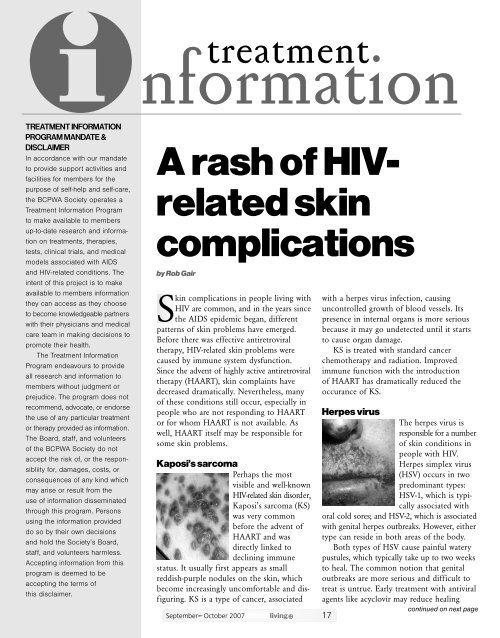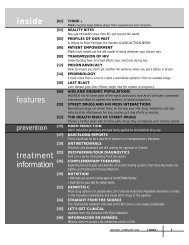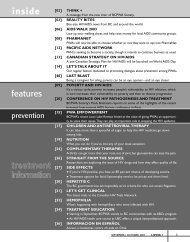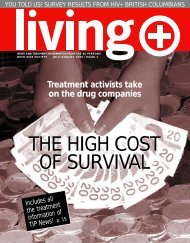iv poz mag.qxd - Positive Living BC
iv poz mag.qxd - Positive Living BC
iv poz mag.qxd - Positive Living BC
You also want an ePaper? Increase the reach of your titles
YUMPU automatically turns print PDFs into web optimized ePapers that Google loves.
issue 50.<strong>qxd</strong>:l<strong>iv</strong> <strong>poz</strong> <strong>mag</strong>.<strong>qxd</strong> 9/3/07 4:04 PM Page 17<br />
treatment<br />
*nformation<br />
TREATMENT INFORMATION<br />
PROGRAM MANDATE &<br />
DISCLAIMER<br />
In accordance with our mandate<br />
to provide support act<strong>iv</strong>ities and<br />
facilities for members for the<br />
purpose of self-help and self-care,<br />
the <strong>BC</strong>PWA Society operates a<br />
Treatment Information Program<br />
to make available to members<br />
up-to-date research and information<br />
on treatments, therapies,<br />
tests, clinical trials, and medical<br />
models associated with AIDS<br />
and HIV-related conditions. The<br />
intent of this project is to make<br />
available to members information<br />
they can access as they choose<br />
to become knowledgeable partners<br />
with their physicians and medical<br />
care team in making decisions to<br />
promote their health.<br />
The Treatment Information<br />
Program endeavours to provide<br />
all research and information to<br />
members without judgment or<br />
prejudice. The program does not<br />
recommend, advocate, or endorse<br />
the use of any particular treatment<br />
or therapy provided as information.<br />
The Board, staff, and volunteers<br />
of the <strong>BC</strong>PWA Society do not<br />
accept the risk of, or the responsibliity<br />
for, da<strong>mag</strong>es, costs, or<br />
consequences of any kind which<br />
may arise or result from the<br />
use of information disseminated<br />
through this program. Persons<br />
using the information provided<br />
do so by their own decisions<br />
and hold the Society’s Board,<br />
staff, and volunteers harmless.<br />
Accepting information from this<br />
program is deemed to be<br />
accepting the terms of<br />
this disclaimer.<br />
A rash of HIVrelated<br />
skin<br />
complications<br />
by Rob Gair<br />
Skin complications in people l<strong>iv</strong>ing with<br />
HIV are common, and in the years since<br />
the AIDS epidemic began, different<br />
patterns of skin problems have emerged.<br />
Before there was effect<strong>iv</strong>e antiretroviral<br />
therapy, HIV-related skin problems were<br />
caused by immune system dysfunction.<br />
Since the advent of highly act<strong>iv</strong>e antiretroviral<br />
therapy (HAART), skin complaints have<br />
decreased dramatically. Nevertheless, many<br />
of these conditions still occur, especially in<br />
people who are not responding to HAART<br />
or for whom HAART is not available. As<br />
well, HAART itself may be responsible for<br />
some skin problems.<br />
Kaposi’s sarcoma<br />
Perhaps the most<br />
visible and well-known<br />
HIV-related skin disorder,<br />
Kaposi’s sarcoma (KS)<br />
was very common<br />
before the advent of<br />
HAART and was<br />
directly linked to<br />
declining immune<br />
status. It usually first appears as small<br />
reddish-purple nodules on the skin, which<br />
become increasingly uncomfortable and disfiguring.<br />
KS is a type of cancer, associated<br />
SeptemberqOctober 2007 l<strong>iv</strong>ing5 17<br />
with a herpes virus infection, causing<br />
uncontrolled growth of blood vessels. Its<br />
presence in internal organs is more serious<br />
because it may go undetected until it starts<br />
to cause organ da<strong>mag</strong>e.<br />
KS is treated with standard cancer<br />
chemotherapy and radiation. Improved<br />
immune function with the introduction<br />
of HAART has dramatically reduced the<br />
occurance of KS.<br />
Herpes virus<br />
The herpes virus is<br />
responsible for a number<br />
of skin conditions in<br />
people with HIV.<br />
Herpes simplex virus<br />
(HSV) occurs in two<br />
predominant types:<br />
HSV-1, which is typically<br />
associated with<br />
oral cold sores; and HSV-2, which is associated<br />
with genital herpes outbreaks. However, either<br />
type can reside in both areas of the body.<br />
Both types of HSV cause painful watery<br />
pustules, which typically take up to two weeks<br />
to heal. The common notion that genital<br />
outbreaks are more serious and difficult to<br />
treat is untrue. Early treatment with ant<strong>iv</strong>iral<br />
agents like acyclovir may reduce healing<br />
continued on next page











